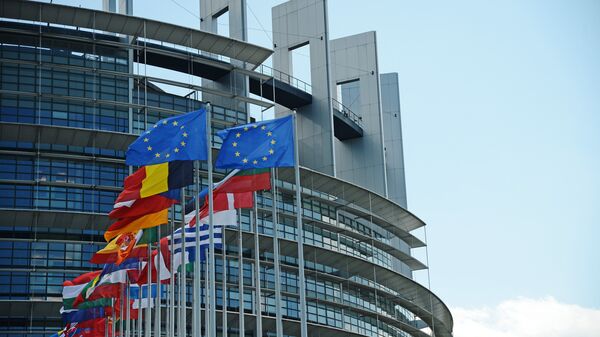In August, European Commissioner for the Security Union Julian King told The Financial Times newspaper that the European Commission was adopting a tougher stance on countering dissemination of terrorist materials and pledged to take "serious action" in order to better protect EU citizens.
Last week, the European Union introduced a bill suggesting that online providers and social media must remove the propaganda of terrorism within one hour or face financial sanctions.
Brussels Treats One Element, Not Reason
Francois-Bernard Huyghe, a researcher specializing in cyberstrategy and terrorism at the French Institute for International and Strategic Affairs (IRIS), told Sputnik that the EU government was overlooking the bigger problem and treating one element and not the root cause of this propaganda.
According to Huyghe, "the efficiency of propaganda is not based on the time a person is exposed to it, as this efficiency depends on the social environment a person lives in."
READ MORE: Kaspersky Lab, Council of Europe Agree to Protect Human Rights on Internet
Huyghe went on to say that he thought "that in this whole discourse on the terrorist propaganda we are being very naive… Mass unemployment, lack of social integration contribute to the conversation. Propaganda is an element, not the reason."
For instance, a person will not become converted to terrorism if his or her mind has been exposed to the propaganda of the Daesh* terrorist group for "three minutes of three hours," the expert added.
New Regulation to Change Nothing, Small Online Platforms to Suffer
Huyghe believed that politicians wanted to take credit for something that was already being done by major Internet platforms: removing prohibited content such as terrorist propaganda.
"I think it won't change anything. GAFA [Google, Apple, Facebook, Amazon] already takes down a lot of terrorist content, firstly because it is outlined by their own regulations, secondly, it is in their interests to quickly remove this terrorist content. Thirdly, they have the means to do so, they have powerful algorithms in place, and they have thousands of people to track it … So it is already being done," the analyst said.
According to La Quadrature du Net, the French non-profit association defending the rights and freedoms of citizens on the Internet, the regulation will push minor online providers to shut down or constantly face the sanctions.
"The fact is that only a few big online platforms would be able to comply with these new obligations, the one-hour deadline in particular. Others… will never be able to comply with these obligations and will permanently be exposed to sanctions … The proposal is not only useless in many respects – it is also counterproductive. Its main effect would be to destroy the only version of Internet compatible with our basic freedoms," the association told Sputnik.
READ MORE: Europol Hits Daesh Propaganda on Web, Twitter Users Say It's Still Ongoing
These developments come as the Internet in recent years has become a major tool in helping jihadists to carry out attacks against civilians in European cities and recruit new members in terrorist cells across the continent.
According to the European Commission, in January alone, almost 700 new pieces of official Daesh propaganda were disseminated online.
Views and opinions expressed in this article are those of Francois-Bernard Huyghe and do not necessarily reflect those of Sputnik.
*Daesh, also known as IS/ISIL/ISIS, is a terrorist group banned in Russia




